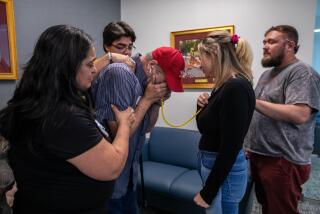BODY WATCH : More Organ Recipients Are Surviving the First Year
- Share via
One-year survival rates for organ-transplant recipients have improved in all categories, according to the United Network for Organ Sharing.
The latest statistics, released recently by the Department of Health and Human Services, show the greatest gains in lung transplants: About 68% of those who receive transplanted lungs survive at least one year, nearly a 15% increase.
The nine-volume, 2,700-page study--done under contract to HHS--reflects data collected from October, 1987, through December, 1991, at 261 hospitals. More than 60,000 organ transplants were performed during that period.
The gains in lung transplants “come from increased experience . . . at centers across the country, technical improvements, and overall improvements in patient selection and donor awareness, all leading to better results and outcomes,” says Robert S. Higgins, a member of UNOS’ thoracic organ-transplant committee.
The increasing number of hospitals that perform organ transplants has contributed to the greater one-year survival rate, Higgins says. “The number of medical centers with expertise in transplantation is continuing to grow. The more transplants we do, the better we are at doing the procedure, the more the numbers will increase.”
Among the other increases reported are a 4% rise for heart-lung recipients to 57%. Those surviving liver transplants for a year rose to 91%. Ninety-one percent of people who received pancreas transplants survived a year, an increase of almost 2%.
Best survival rates continue to occur in kidney-transplant recipients. According to the report, 94% survive one year after transplant, about a 1% increase.
The smallest gains reported were among heart-transplant patients. About 83% were alive one year after transplant, a 0.5% increase.
“We’re seeing continued improvement,” Higgins says. “The major problem is that there still aren’t enough organ donors. That is the major challenge; we are still falling short of our needs.”






